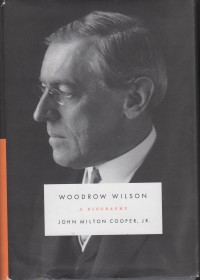Woodrow Wilson by John Milton Cooper, Jr. (2009. Knopf. ISBN 978-0-307-26541-8)
His name was Thomas Woodrow Wilson and his earliest friends and his relatives called him “Tommy”. That’s something I learned early on in this mammoth (702pp) work by John Milton Cooper which chronicles our 28th President’s life and legacy. Many of us learned in grade school that Wilson was our president during “The Great War” (WWI) and that he had something to do with the founding of the ill-fated League of Nations. History and political science buffs like me probably also remember that, despite Wilson’s sponsorship of the proposed forerunner to the United Nations, the United States never joined the League. Between Wilson’s birth in the South (Virginia) and his death after a stroke (the stroke occurred in 1920 and he lived three years in virtual seclusion, including the last year of his Presidency due to the malady’s impact on his mobility and intellect), Wilson lived a life that bridged the Civil War and the Roaring 20’s. He was the first post-Civil War President born in the South; the son of a Presbyterian minister and a Progressive Democrat who spent little time in elected office prior to ascending to the highest office in the land. He was a professor, a lawyer, and president of Princeton. In many ways Wilson’s political pedigree, as portrayed by Cooper, bears a striking resemblance to that of Barack Obama, with one major exception. Despite early support from Black voters, who believed Wilson was Progressive on the issue of racial equality, Woodrow Wilson never embraced integration of the races in his heart, a failing that is glaring in Cooper’s reportage of interactions between Wilson and African American leaders of the early 20th century.
Written in a crisp, matter-of-fact style, this biography paints a puzzling picture of our 28th President. Intellectually brilliant; open to compromise with Progressives from the Republican side on issues such as tariffs, taxes, the creation of the FTC, and the popular election of U.S. Senators; able to work for peace in Mexico and in Europe; Wilson struggled to understand the nuances of party politics and, to his detriment, ended up entering a war that he had worked hard to avoid. I always had the impression that America’s entry into WWI was due to circumstances forcing Wilson’s hand and in some ways, that’s true. Germany’s resorting to unrestricted submarine warfare in 1916, and the resulting loss of American lives on merchant ships and ocean liners flying under foreign flags, was the “straw” that finally broke Wilson’s resolve to remain neutral. But unexpectedly (for me), Cooper ensures that Wilson’s legacy as a war president is remembered as one of firm resolve. Once Germany forced Wilson’s hand, he never looked back. This despite the fact that he was appalled by the notion of trench warfare and American boys dieing in a war not of our making.
All of Wilson’s considerable domestic successes are chronicled here in great detail. So too are his failures with respect to racial equality, civil rights for war dissidents, and women’s suffrage. Curiously, despite his wife and daughters being suffragettes, Wilson was a late comer to the notion that American women should be allowed to vote. He was also, unexpectedly given his Presbyterian upbringing, against Prohibition, though by the time of its passage, his power to influence Congress was hampered due to his strong support of a peace with Germany that included the League of Nations.
My only criticism of the book is that it lacks the soul and vibrant human drama that A Team of Rivals (see review below or in the Book Review Archive). It would be hard to compare Wilson’s story to that of our 16th President, though Lincoln is the president, according to Cooper that Woodrow Wilson sought to emulate. But there is something to be said for giving literary treatment to factual information as was done in Goodwin’s retelling of the Lincoln story. A bit of that style in retelling the life of Thomas Woodrow Wilson would have elevated this book to a higher plain.
In the end, if you are a student of politics or interested in the current deadlock between our two political parties, this book is a required read. The deadlock between Wilson and Congress over the League of Nations reads eerily familiar to those of us reading the newspapers today.
4 stars out of 5.



